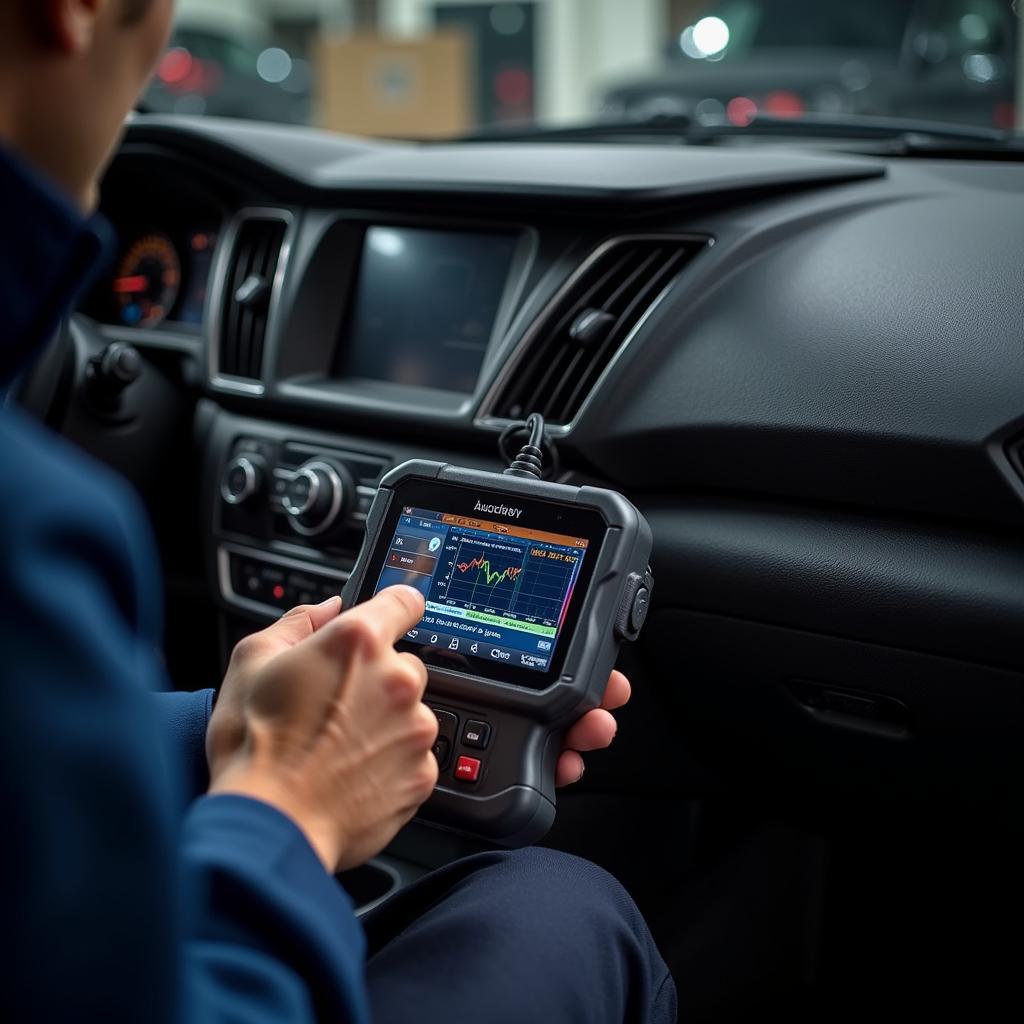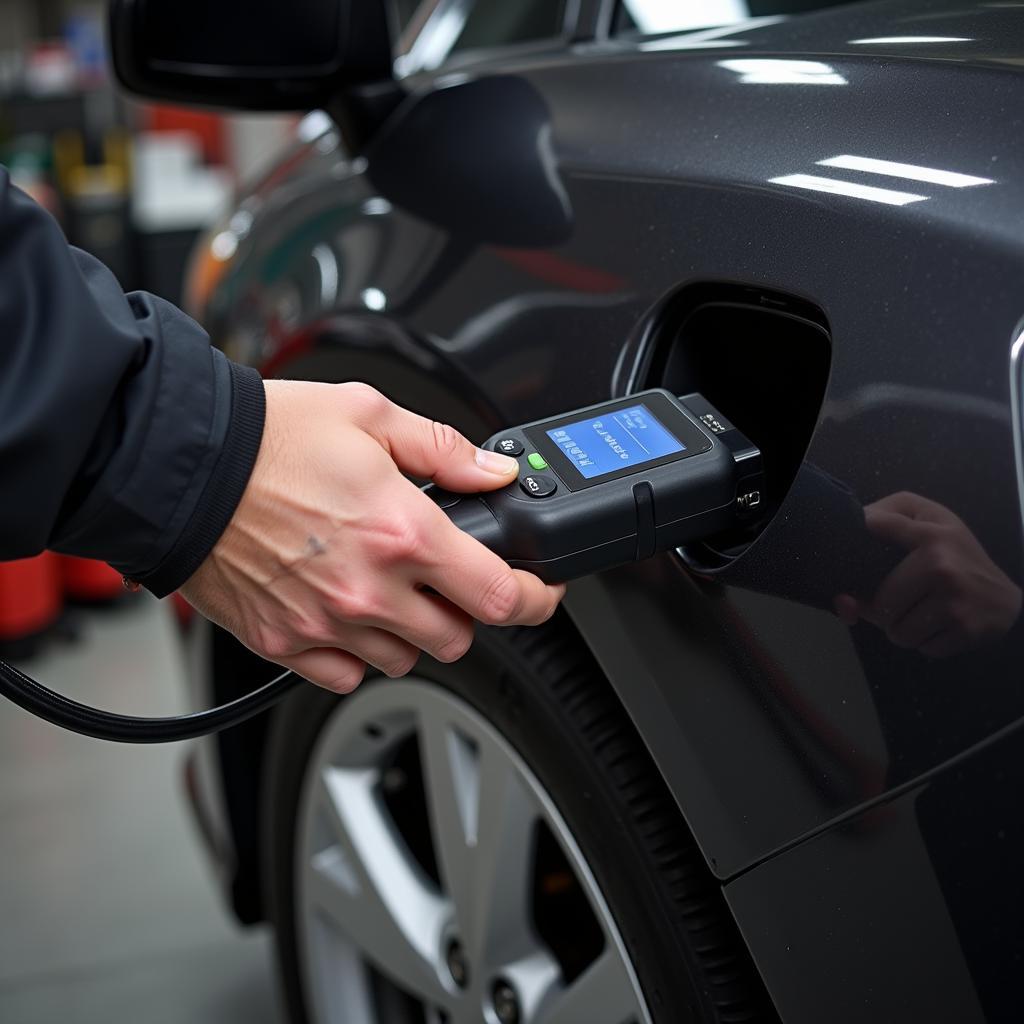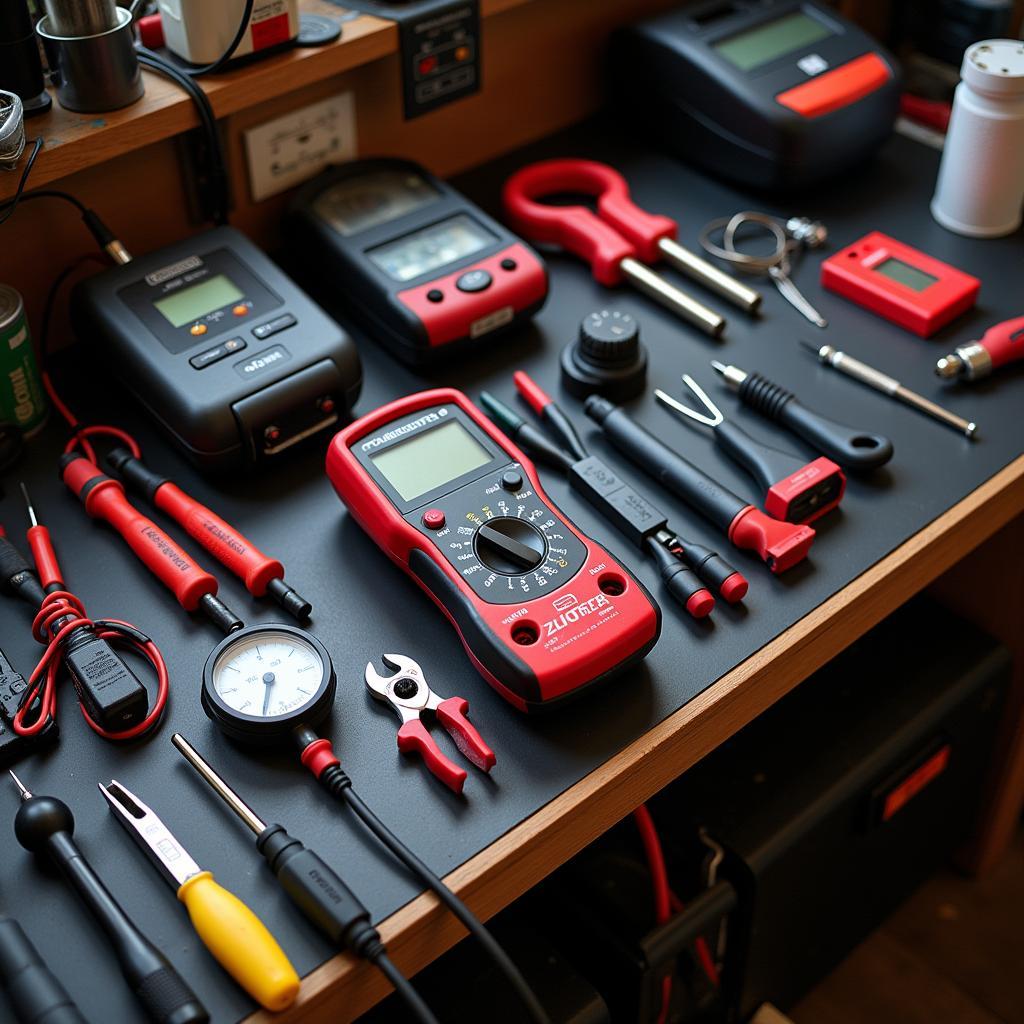Diagnostic Car Equipment has become indispensable for modern vehicle maintenance and repair. Whether you’re a professional mechanic or a car enthusiast, having the right tools can help you identify and diagnose car problems quickly and efficiently. This comprehensive guide will delve into the world of diagnostic car equipment, exploring its importance, different types, and factors to consider when choosing the best tools for your needs.
Why is Diagnostic Car Equipment Essential?
Modern vehicles are equipped with complex electronic systems that control various functions. When a problem arises, pinpointing the root cause can be challenging without the proper equipment. Diagnostic car equipment acts as the eyes and ears of a mechanic, providing valuable insights into the vehicle’s health and performance.
Here’s why diagnostic car equipment is essential:
- Accurate Diagnosis: Diagnostic tools can read and interpret error codes stored in the vehicle’s computer system, providing accurate information about the problem.
- Time and Cost Savings: By quickly identifying the root cause of the issue, diagnostic equipment helps save time and money that would otherwise be wasted on unnecessary repairs.
- Improved Repair Efficiency: Mechanics can use diagnostic data to make informed decisions about the best course of action, leading to faster and more efficient repairs.
- Enhanced Vehicle Performance: Regular vehicle diagnostics can help identify minor issues before they escalate into major problems, ensuring optimal performance and longevity.
 Modern Car Diagnostic Equipment in a Workshop
Modern Car Diagnostic Equipment in a Workshop
Types of Diagnostic Car Equipment
Diagnostic car equipment encompasses a wide range of tools, each serving a specific purpose. Some of the most common types include:
1. OBD-II Scanners
OBD-II (On-Board Diagnostics) scanners are essential tools that connect to a vehicle’s OBD-II port, usually located under the dashboard. They retrieve and display diagnostic trouble codes (DTCs), which indicate specific areas of malfunction within the vehicle’s systems.
There are various types of OBD-II scanners available:
- Basic Code Readers: These affordable scanners can read and clear basic DTCs, providing a general idea of the problem.
- Advanced Scan Tools: Offering more comprehensive functionality, these tools can access live data streams, perform bi-directional control tests, and provide detailed information about various vehicle systems.
- Smartphone-Based Scanners: These compact scanners connect to your smartphone or tablet via Bluetooth, allowing you to access diagnostic information through dedicated apps.
 Mechanic Using an OBD-II Scanner to Diagnose Car Problem
Mechanic Using an OBD-II Scanner to Diagnose Car Problem
2. Multimeters
Multimeters are versatile tools used to measure various electrical properties, such as voltage, current, and resistance. In car diagnostics, multimeters help diagnose electrical issues, test battery health, check for continuity in wiring, and more.
3. Oscilloscopes
Oscilloscopes are advanced diagnostic tools used to measure and visualize electrical signals over time. They are particularly useful for diagnosing complex electronic systems, such as sensors, actuators, and engine control units.
4. Pressure Gauges
Pressure gauges are essential for testing and diagnosing pressure-related systems, such as the fuel system, cooling system, and brake system. They come in various types and ranges to suit different applications.
5. Vacuum Gauges
Vacuum gauges measure the vacuum pressure in the intake manifold, providing insights into engine performance and identifying potential issues like vacuum leaks.
 Variety of Diagnostic Car Equipment on a Workbench
Variety of Diagnostic Car Equipment on a Workbench
Factors to Consider When Choosing Diagnostic Car Equipment
Selecting the right diagnostic car equipment depends on various factors, including your budget, skill level, and intended use.
Here are some key considerations:
- Budget: Diagnostic car equipment can range in price from affordable code readers to high-end professional tools. Determine your budget and prioritize features accordingly.
- Skill Level: If you’re a beginner, starting with a basic code reader or a user-friendly scan tool might be suitable. Professionals might require more advanced tools with specialized functions.
- Vehicle Compatibility: Ensure that the diagnostic equipment you choose is compatible with the make, model, and year of your vehicle or the vehicles you intend to work on.
- Features and Functionality: Consider the specific features and functions you need, such as live data streaming, bi-directional control, and special test modes.
- Software Updates: Choose diagnostic equipment from reputable brands that offer regular software updates to ensure compatibility with newer vehicle models and technologies.
- User Interface: Opt for a tool with a user-friendly interface, intuitive software, and clear display for ease of use.
Conclusion
Diagnostic car equipment is crucial for accurate and efficient vehicle diagnostics and repairs. By understanding the different types of tools available and considering your specific needs, you can choose the right equipment to streamline your diagnostic process and keep your vehicle running smoothly. Investing in quality diagnostic car equipment is an investment in your vehicle’s health and your peace of mind.
FAQs
Q: Do I need a professional mechanic to use diagnostic car equipment?
A: While some advanced tools require professional expertise, there are user-friendly options available for car enthusiasts and DIYers.
Q: Can I use a car diagnostic tool for sele?
A: Yes, there are car diagnostic tools specifically designed for certain vehicle makes and models.
Q: What is a program for car diagnostic?
A: Car diagnostic programs are software applications used in conjunction with diagnostic hardware to provide a comprehensive analysis of a vehicle’s systems.
Q: Are there any good best bluetooth car diagnostic tools available?
A: Yes, many Bluetooth car diagnostic tools offer convenient wireless connectivity and access to diagnostic information through smartphone apps.
Q: Can I use an ipad car diagnostic tool?
A: Some diagnostic tools are compatible with iPads, allowing you to use your tablet as a display and control interface.
Q: What is an nt210 car diagnostic tool?
A: The NT210 is a specific model of car diagnostic tool known for its wide vehicle coverage and advanced functionalities.
Q: How often should I have my car diagnosed?
A: It’s generally recommended to have your car diagnosed annually or as part of your regular maintenance schedule.
Need expert assistance with car diagnostics or choosing the right equipment? Contact us via WhatsApp: +1(641)206-8880, Email: [email protected]. Our dedicated customer support team is available 24/7 to help you.

Leave a Reply